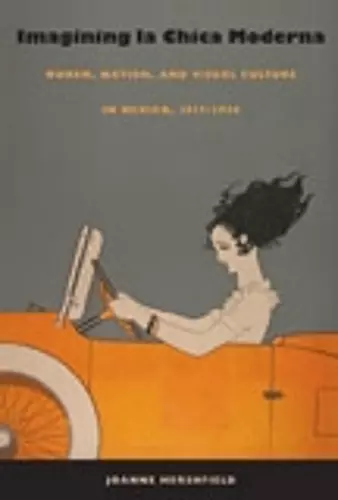Imagining la Chica Moderna
Women, Nation, and Visual Culture in Mexico, 1917–1936
Format:Hardback
Publisher:Duke University Press
Published:27th Jun '08
Currently unavailable, and unfortunately no date known when it will be back

How the global "new woman" phenomenon of the early 20th century played out in Mexico
A look at how the modern woman was envisioned in postrevolutionary Mexican popular culture and how she figured in contestations over Mexican national identity.In the years following the Mexican Revolution, visual images of la chica moderna, the modern woman, au courant in appearance and attitude, popped up in mass media across the country. Some of the images were addressed directly to women through advertisements, as illustrations accompanying articles in women’s magazines, and on the “women’s pages” in daily newspapers. Others illustrated domestic and international news stories, promoted tourism, or publicized the latest Mexican and Hollywood films. In Imagining la Chica Moderna, Joanne Hershfield examines these images, exploring how the modern woman was envisioned in Mexican popular culture and how she figured into postrevolutionary contestations over Mexican national identity.
Through her detailed interpretations of visual representations of la chica moderna, Hershfield demonstrates how the images embodied popular ideas and anxieties about sexuality, work, motherhood, and feminine beauty, as well as class and ethnicity. Her analysis takes into account the influence of mexicanidad, the vision of Mexican national identity promoted by successive postrevolutionary administrations, and the fashions that arrived in Mexico from abroad, particularly from Paris, New York, and Hollywood. She considers how ideals of the modern housewife were promoted to Mexican women through visual culture; how working women were represented in illustrated periodicals and in the Mexican cinema; and how images of traditional “types” of Mexican women, such as la china poblana (the rural woman), came to define a “domestic exotic” form of modern femininity. Scrutinizing photographs of Mexican women that accompanied articles in the Mexican press during the 1920s and 1930s, Hershfield reflects on the ways that the real and the imagined came together in the production of la chica moderna.
“This interesting volume approaches a very important topic: the changes in visual culture relating to middle- and upper-class women in Mexico during the years immediately following the violence of the Mexican revolution. . . . [T]his introduction to the topic of changing visual culture related to women in a time of political, economic, and social change is well conceived and fascinating.” - Linda B. Hall, The Americas
“With Imagining la Chica Moderna, Joanne Hershfield has made another important contribution to our understanding of popular culture in post-revolutionary Mexico.” - Stephanie Mitchell, Social History
“Joanne Hershfield’s intriguing monograph, Imagining la Chica Moderna reminds readers of an era following the 1910-1920 Mexican revolution in which multiple cultural experiments emerged. . . . Imaging La Chica Moderna is as insightful as it is suggestive.” - Marjorie Becker, Journal of Social History
“Richly illustrated, this book provides a smart, engaging and accessible study of Mexican modernity through the lens of popular visual culture.” - Freya Schiwy, Bulletin of Latin American Research
“[A] detailed and comprehensive study.” - Georgina Jimenez, Latin American Review of Books
“[S]everal aspects of Hershfield’s study recommend it for classroom use. . . . [She] writes clearly, carefully avoids jargon and cumbersome theoretical digressions, and assumes no prior knowledge of Mexican history. Her book might be productively used in any class that seeks to explore the relationship between visual culture and social life.” - Jocelyn Olcott, American Historical Review
“Imagining la Chica Moderna is an engaging book that both demonstrates the role of gender in fashioning the Mexican nation and underscores the primacy of popular culture in that enterprise.”—Ann Marie Stock, editor of Framing Latin American Cinema: Contemporary Critical Perspectives
“Joanne Hershfield’s book will become an essential reference guide for unpacking la chica moderna as a central trope of postrevolutionary Mexican society. By demonstrating the ways that ‘the modern girl’ was simultaneously cosmopolitan and native, Hershfield makes sense of the seemingly out-of-place phenomenon of the ‘Mexican flapper’ and her multiple meanings within the project of Mexican nationhood.”—Eric Zolov, author of Refried Elvis: The Rise of the Mexican Counterculture
“[A] detailed and comprehensive study.” -- Georgina Jimenez * Latin American Review of Books *
“[S]everal aspects of Hershfield’s study recommend it for classroom use. . . . [She] writes clearly, carefully avoids jargon and cumbersome theoretical digressions, and assumes no prior knowledge of Mexican history. Her book might be productively used in any class that seeks to explore the relationship between visual culture and social life.” -- Jocelyn Olcott * American Historical Review *
“Joanne Hershfield’s intriguing monograph, Imagining la Chica Moderna reminds readers of an era following the 1910-1920 Mexican revolution in which multiple cultural experiments emerged. . . . Imaging La Chica Moderna is as insightful as it is suggestive.” -- Marjorie Becker * Journal of Social History *
“Richly illustrated, this book provides a smart, engaging and accessible study of Mexican modernity through the lens of popular visual culture.” -- Freya Schiwy * Bulletin of Latin American Research *
“This interesting volume approaches a very important topic: the changes in visual culture relating to middle- and upper-class women in Mexico during the years immediately following the violence of the Mexican revolution. . . . [T]his introduction to the topic of changing visual culture related to women in a time of political, economic, and social change is well conceived and fascinating.” -- Linda B. Hall * The Americas *
“With Imagining la Chica Moderna, Joanne Hershfield has made another important contribution to our understanding of popular culture in post-revolutionary Mexico.” -- Stephanie Mitchell * Social History *
ISBN: 9780822342212
Dimensions: unknown
Weight: 494g
216 pages